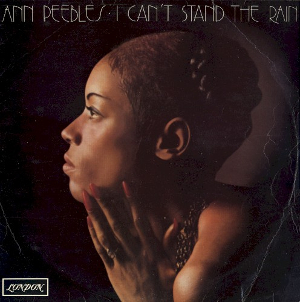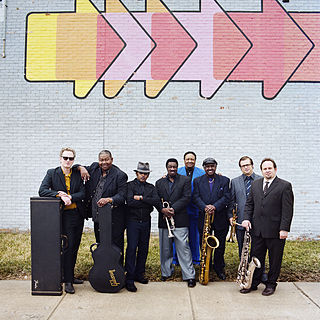Memphis soul, also known as the Memphis sound, is the most prominent strain of Southern soul. It is a shimmering, sultry style produced in the 1960s and 1970s at Stax Records and Hi Records in Memphis, Tennessee, featuring melodic unison horn lines, organ, guitar, bass, and a driving beat on the drums.
Roland Robinson was a longtime Memphis studio session bass player and songwriter. Robinson was a cousin and close friend of Teenie Hodges, Al Green's lead guitarist in the 1970s when Green recorded with the famed Hi Records staff band, the Hi Rhythm Section.
Mabon Lewis "Teenie" Hodges was an American musician known for his work as a rhythm and lead guitarist and songwriter on many of Al Green's soul hits, and those of other artists such as Ann Peebles and Syl Johnson, on Hi Records in the 1970s. His credits as a songwriter include "Take Me to the River", "Love and Happiness", "L-O-V-E (Love)", and "Here I Am ".
Hi Records is an American soul music and rockabilly label founded in Memphis, Tennessee, in 1957 by singer Ray Harris, record store owner Joe Cuoghi, Bill Cantrell and Quinton Claunch, and three silent partners, including Cuoghi's lawyer, Nick Pesce.

Let's Stay Together is the fourth album by the soul singer Al Green, released in 1972, and is the follow-up to his moderate success Al Green Gets Next to You. It was recorded at Royal Recording Studio, 1320 S. Lauderdale, in Memphis and was a success, peaking at number eight on the pop albums chart and became the first of six albums to peak at number-one on the soul album chart. It is best known for the title track "Let's Stay Together", which became Green's signature song and his only number-one pop hit single. The album was the third produced by Willie Mitchell and marked the beginning of Green's classic period of critically acclaimed albums. Let's Stay Together was reissued in 2003 by The Right Stuff.

Al Green Explores Your Mind is the eighth album by soul singer Al Green. Unlike previous Al Green albums, this album featured only one major hit, the U.S. #7 hit "Sha-La-La ", but did contain the original version of "Take Me to the River", a song which went to #26 on the Billboard chart when covered by Talking Heads in 1978. In 2004, the song "Take Me to the River" was ranked number 117 on Rolling Stone magazine's list of the 500 greatest songs of all time.

Al Green Is Love is the ninth album by soul singer Al Green. It was his final of six consecutive albums to hit number 1 on the R&B/Soul Albums chart, and it peaked into the Top 40 on the Pop Albums chart.

Livin' for You is the seventh album from soul musician Al Green. Released in 1973 it includes the hit title track and "Let's Get Married." The album cracked the Top 25 in the Billboard Pop Albums chart and was the fourth album from the artist to peak at #1 on the Soul Albums chart.

Full of Fire is the 10th studio album by soul singer Al Green, released in 1976.

Have a Good Time is the 11th studio album by soul singer Al Green, released in 1976.
"Take Me to the River" is a 1974 song written by singer Al Green and guitarist Mabon "Teenie" Hodges. Hit versions were recorded by both Syl Johnson and Talking Heads. In 2004, Al Green's original version was ranked number 117 on Rolling Stone magazine's list of the Rolling Stone's 500 Greatest Songs of All Time.

I Can't Stand the Rain is an album by Ann Peebles. It was released on the Hi label in 1974.

"I Can't Stand the Rain" is a song originally recorded by Ann Peebles in 1973, and written by Peebles, Don Bryant, and Bernard "Bernie" Miller. Other hit versions were later recorded by Eruption, Tina Turner and Lowell George. The original version is ranked at 197 on Rolling Stone's 500 Greatest Songs of All Time.
Leroy Hodges is an American electric bass player.

Call Me is the sixth album by soul singer Al Green. It is widely regarded as Green's masterpiece, and has been called one of the best soul albums ever made. In 2003 the TV network VH1 named it the 70th greatest album in any genre. Call Me was a Top 10 Billboard Pop Album, and the third #1 Soul Album. In 2003, the album was ranked number 289 on Rolling Stone magazine's list of the 500 greatest albums of all time, and 290 in a 2012 revised list. Praised for his emotive singing style, Green here incorporates country influences, covering both Willie Nelson and Hank Williams. This album contained three top 10 singles on the Billboard Hot 100: "You Ought to Be with Me," "Here I Am " and "Call Me ."
Howard Lee Grimes was an American drummer, best known as a member of the Hi Rhythm Section on records by Al Green, Ann Peebles and others in the 1970s.

The Bo-Keys are a soul jazz band from Memphis, Tennessee, formed as an homage to the city's rich musical tradition.

Royal Studios is a recording studio located in Memphis, Tennessee, United States. Established in 1956, it is one of the oldest continuously operated music recording studios in the world.
Lawrence "Boo" Mitchell is an American record producer, musician, songwriter, audio engineer, and owner of Royal Studios in Memphis, Tennessee. He is best known for his work with Al Green, Solomon Burke, Anthony Hamilton, Rod Stewart, John Mayer, 8 Ball, Lamont Dozier, William Bell and Cody Chesnutt.

Archie "Hubbie" Turner, sometimes known as "Hubbie" Mitchell, is an American keyboard player and songwriter who was a member of the Hi Rhythm Section in Memphis, Tennessee and has featured on over forty albums.











